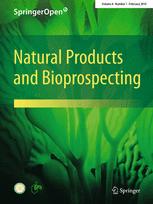|
|
Brown Algae(Phaeophyceae) from the Coast of Madagascar:preliminary Bioactivity Studies and Isolation of Natural Products
Collect
Marie Pascaline Rahelivao, Margit Gruner, Hanta Andriamanantoanina, Ingmar Bauer, Hans-Joachim Knölker
Natural Products and Bioprospecting. 2015, 5 (5): 223-235.
DOI: 10.1007/s13659-015-0068-0
Eight species of brown algae(Phaeophyceae) from the coast of Madagascar have been investigated for their chemical constituents. Fucosterol(3) was obtained as the most abundant compound. The brown alga Sargassum ilicifolium was the source for the first isolation of the terpenoid C27-alcohol 1, 1', 2-trinorsqualenol(1) from marine sources. From S. incisifolium we isolated the highly unsaturated glycolipid 1-O-palmitoyl-2-O-stearidonoyl-3-O-β-D-galactopyranosylglycerol(4) and we report the first full assignment of its 1H and 13C NMR data. Apo-9'-fucoxanthinone(8) along with 24-ketocholesterol(5),(22E)-3β-hydroxycholesta-5, 22-dien-24-one(6), and saringosterol(7) were obtained from Turbinaria ornata. The crude extracts of all eight species of brown algae exhibited a pronounced antimicrobial activity against the Gram-positive bacteria Bacillus cereus, Staphylococcus aureus, and Streptococcus pneumoniae.
References |
Related Articles |
Metrics
|
|
|
Intestinal Absorption of Ergostane and Lanostane Triterpenoids from Antrodia cinnamomea Using Caco-2 Cell Monolayer Model
Collect
Qi Wang, Xue Qiao, Yi Qian, Zi-wei Li, Yew-min Tzeng, De-min Zhou, De-an Guo, Min Ye
Natural Products and Bioprospecting. 2015, 5 (5): 237-246.
DOI: 10.1007/s13659-015-0072-4
Antrodia cinnamomea is a precious medicinal mushroom. It exhibits promising therapeutic effects on cancer, intoxication, hypertension, hepatitis, and inflammation. Its major bioactive constituents are ergostane and lanostane triterpenoids. In this study, we used intestinal Caco-2 cell monolayer model to reveal the intestinal absorption property of 14 representative triterpenoids from A. cinnamomea. The bidirectional transport through the monolayer at different time points was monitored by a fully validated LC/MS/MS method. In the case of pure compounds, ergostanes 5(25R-antcin H), 6(25S-antcin H) and 10(25R-antcin B) could readily pass through the Caco-2 cell layer, whereas lanostanes 13(dehydroeburicoic acid) and 14(eburicoic acid) could hardly pass through. When the cells were treated with A. cinnamomea extract, antcins A, B, C, H and K(1-6 and 9-11) were absorbed via passive transcellular diffusion, and showed high PAB and PBA values(>2.5×10-5 cm/s). Meanwhile, the lanostanes dehydrosulphurenic acid(8), 15α-acetyldehydrosulphurenic acid(12), 13 and 14 exhibited poor permeability. Transport features of these compounds were consistent with their pharmacokinetic behaviors in rats. This study could also be helpful in predicting the intestinal absorption of A. cinnamomea in human.
References |
Related Articles |
Metrics
|
|
|
Hybrid Monoterpenoid Indole Alkaloids Obtained as Artifacts from Rauvolfia tetraphylla
Collect
Yuan Gao, Dong-Sheng Zhou, Ping Hai, Yan Li, Fei Wang
Natural Products and Bioprospecting. 2015, 5 (5): 247-253.
DOI: 10.1007/s13659-015-0074-2
Five new hybrid monoterpenoid indole alkaloids bearing an unusual 2, 2-dimethyl-4-oxopiperidin-6-yl moiety, namely rauvotetraphyllines F-H(1, 3, 4), 17-epi-rauvotetraphylline F(2) and 21-epi-rauvotetraphylline H(5), were isolated from the aerial parts of Rauvolfia tetraphylla. Their structures were established by extensive spectroscopic analysis. The new alkaloids were evaluated for their cytotoxicity in vitro against five human cancer cell lines.
References |
Related Articles |
Metrics
|
|
|
Lanostane-Type Triterpenoids from Scilla scilloides and Structure Revision of Drimiopsin D
Collect
Fu-Cai Ren, Li-Xia Wang, Qin Yu, Xian-Jun Jiang, Fei Wang
Natural Products and Bioprospecting. 2015, 5 (5): 263-270.
DOI: 10.1007/s13659-015-0076-0
Two hitherto unknown lanostane-type triterpenoids, namely scillascillol(1) and scillascillone(2), and a hitherto unknown norlanostane-triterpene glycoside, namely scillascilloside B-1(3), were isolated from the ethanol extract of the whole plants of Scilla scilloides. Their structures were elucidated on the basis of extensive spectroscopic studies. In addition, the structure of drimiopsin D(6a) has been revised as 2, 5-dimethoxy-8-methyl-1, 3, 6-trihydroxyxanthone(6) by reanalysis of the spectroscopic data.
References |
Related Articles |
Metrics
|
|

